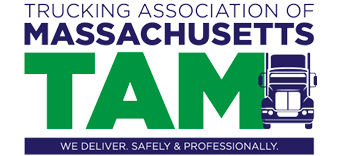On May 14, Kevin Weeks, the executive director of the Trucking Association of Massachusetts, submitted written testimony in support of House Bill 3178, An Act Relative to Truck Inspections. The testimony is provided below, and a PDF is available for download.
For additional information, contact the Trucking Association of Massachusetts.
Honorable William Straus, House Chair
Honorable Joseph Boncore, Senate Chair
Joint Committee on Transportation
State House, Room 134
Boston, Massachusetts 02133
Dear Chairman Straus, Chairman Boncore and Members of the Committee:
On behalf of the over 250 trucking company members of the Trucking Association of Massachusetts (“TAM”), I am writing in strong support of House Bill 3178, An Act Relative to Truck Inspections. This legislation will lead to increased public safety oversight of truck inspections without having an adverse effect on the shipping of goods throughout the Commonwealth.
As you may know, the Federal Motor Carrier Safety Administration (“FMCSA”) is required under 49 CFR 350.201(c) to work closely with one designated state agency to oversee the roadside inspection of commercial motor vehicles and commercial carrier facilities. The roadside inspection program consists of roadside inspections performed by qualified safety inspectors following the guidelines of the North American Standard, which was developed by FMCSA and the Commercial Vehicle Safety Alliance (“CVSA”), an association of state, provincial, and federal officials responsible for the administration and enforcement of motor carrier safety laws. Accordingly, the Commonwealth designated the Massachusetts State Police (“MSP”) to work with the FMCSA. The MSP enforcement personnel are properly trained, certified and continually educated in commercial truck inspections and terminal reviews by FMCSA.
Under the current system, any municipality can ask the MSP to train their officers to conduct federally regulated roadside commercial carrier inspections. Once the MSP trains these municipal officers, however, it loses all ability to provide accountability and oversight in ensuring that inspections are actually conducted in compliance with federal regulations. Put simply, municipal truck teams do not receive the extensive training the MSP Truck Team receives nor do they have the MSP’s commercial motor vehicle experience. Already in a number of municipalities, commercial motor vehicle operators have been improperly cited for alleged infractions that simply were not violations. (i.e. citation for having the wrong hazmat placard when, in fact, drivers have the correct ones; citation for existence of wet valves despite a requirement of federal regulations; etc.)
As a result, House Bill 3178 would formally establish a mechanism for the oversight and inspection of roadside commercial carrier inspections. In doing so, this legislation seeks to ensure that only appropriate and trained individuals conduct routine commercial carrier inspections. Patterned after the model language created by the CVSA, this legislation gives the MSP specific authority to establish regulations and procedures for the certification of municipal police officers.
Specifically, this legislation requires the MSP to promulgate regulations relative to:
- the delineation of roles and responsibilities within a local police department as it relates to coordinating efforts with the MSP;
- the commercial motor safety data collection, management and distribution;
- the fine and sanction structure for violations of commercial motor vehicle laws and regulations;
- the collection and deposit of said fines;
- the periodic review and submission of a commercial vehicle safety to ensure consistency with the statewide enforcement plan;
While the proposed legislation would provide that the MSP can decertify any municipal law enforcement official for violating the eventual regulations, the legislation expressly prohibits the MSP from unreasonably refusing to retrain any decertified official or department upon request.
It is important to note that this legislation does not mean that uncertified municipal law enforcement personnel will not be able to stop commercial motor vehicles. By including the legal protections associated with “probable cause”, uncertified local law enforcement will still be able to stop trucks that present a danger to the local community. Accordingly, an officer who has formed the basis for “probable cause” will not be prohibited from making a random stop and inspection. No judicial officer will “throw out” a citation or stop on the basis that a local police officer stopped and cited a commercial motor vehicle because it leaked fuel; operated without working lights or potentially presented some other public safety hazard.
This legislation will do more than improve the enforcement of commercial motor vehicle. It will create a cogent system of enforcement that recognizes a uniform cause – protecting the general public while recognizing the importance and necessity of commercial transportation. As reported by the Federal Highway Administration, 87% of all manufactured goods in Massachusetts were transported by truck. In 2013, the trucking industry in Massachusetts provided 120,340 jobs, or 4% of the state’s overall employment. Total trucking industry wages paid in Massachusetts in 2013 exceeded $6 billion, with an average annual trucking industry salary of $49,879. A disjointed and inconsistent enforcement system will not only threaten the affect the Commonwealth’s residents’ ability to receive affordable and available goods, but it will affect the livelihood of the many individuals working in the trucking industry.
With this in mind, HB 3178 will create one unified mechanism for the oversight and accountability of roadside truck inspections. The MSP Truck Team receives federal training and has extensive, specialized experience in the enforcement of the laws and regulations governing the operation of commercial motor vehicles. The MSP is the law enforcement agency in the Commonwealth that has the appropriate training, experience and, most importantly, an ongoing relationship with federal transportation agencies necessary to coordinate roadside commercial vehicle inspections. By coordinating its efforts with the MSP Truck Team, local municipalities will still be able to insure that commercial motor vehicles are operating in accordance with federal laws and regulations. HB 3178, modeled after draft legislation from national and international experts in commercial carrier enforcement, is a sensible and responsible step in the Commonwealth’s best interests.
I appreciate your consideration of this important matter and respectfully request that the Committee release HB 3178 with a favorable report. If you have any questions or concerns, please do not hesitate to contact me.
Sincerely,
Kevin Weeks
Executive Director



